Raise Your Test Scores: Strategies & Tips for Students
advertisement
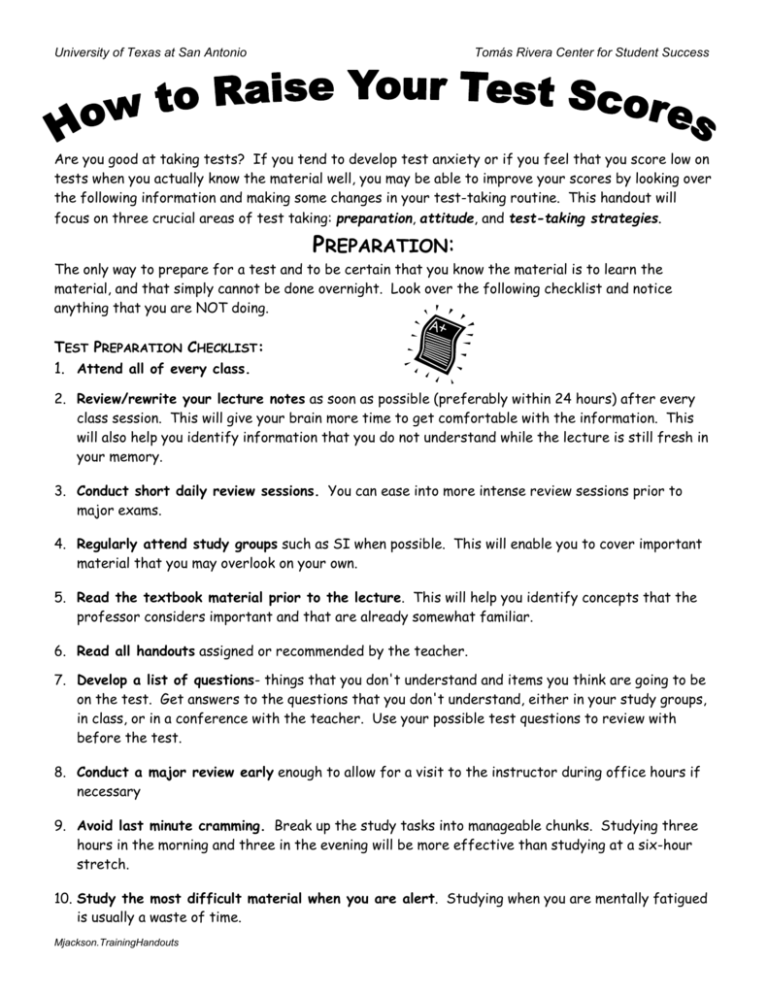
University of Texas at San Antonio Tomás Rivera Center for Student Success Are you good at taking tests? If you tend to develop test anxiety or if you feel that you score low on tests when you actually know the material well, you may be able to improve your scores by looking over the following information and making some changes in your test-taking routine. This handout will focus on three crucial areas of test taking: preparation, attitude, and test-taking strategies. PREPARATION: The only way to prepare for a test and to be certain that you know the material is to learn the material, and that simply cannot be done overnight. Look over the following checklist and notice anything that you are NOT doing. TEST PREPARATION CHECKLIST: 1. Attend all of every class. 2. Review/rewrite your lecture notes as soon as possible (preferably within 24 hours) after every class session. This will give your brain more time to get comfortable with the information. This will also help you identify information that you do not understand while the lecture is still fresh in your memory. 3. Conduct short daily review sessions. You can ease into more intense review sessions prior to major exams. 4. Regularly attend study groups such as SI when possible. This will enable you to cover important material that you may overlook on your own. 5. Read the textbook material prior to the lecture. This will help you identify concepts that the professor considers important and that are already somewhat familiar. 6. Read all handouts assigned or recommended by the teacher. 7. Develop a list of questions- things that you don't understand and items you think are going to be on the test. Get answers to the questions that you don't understand, either in your study groups, in class, or in a conference with the teacher. Use your possible test questions to review with before the test. 8. Conduct a major review early enough to allow for a visit to the instructor during office hours if necessary 9. Avoid last minute cramming. Break up the study tasks into manageable chunks. Studying three hours in the morning and three in the evening will be more effective than studying at a six-hour stretch. 10. Study the most difficult material when you are alert. Studying when you are mentally fatigued is usually a waste of time. Mjackson.TrainingHandouts 11. Gear up for the test with a good night's sleep and a nourishing meal or snack before test time. Your brain doesn't work as well if you are fatigued or stressed. You will be much more likely to recall what you've learned if you are rested and ready. Additionally, plan out what you're going to eat and drink before the test. Brain cells run on sugar. If your blood sugar is low while you are testing, your brain will not function up to its capacity. You want full capacity! Plan to eat before you start, and if a test is going to be particularly long, you might keep some candy with you to snack on while you work. Finally, contrary to many students' beliefs, an extra shot of caffeine will not improve your test-taking ability very much. Caffeine may help you feel more alert, but it doesn't support the brain functions as blood sugar does, and it will never take the place of adequate preparation. If caffeine could help us score better on tests, we'd all be scholars. Your Attitude Can Change Your Score Many students score low on tests because they dislike them and can't wait to get through the ordeal. Simply slowing down, considering each answer carefully, and being patient and persistent with every question can raise your score by a few critical points. You need stamina and endurance to score your best on a test. Use the test taking strategies, which are offered in this handout. Just like an athlete approaching a big game, stay focused and don't let any opportunities to score get passed you. Consider these scenarios: A. Let's say you are taking a test with 45 multiple-choice questions. You feel good about 25 of your answers, and you marked 20 to go back to. If you are nervous, not focused and not using any test strategies, your feelings of anxiety and frustration rise. For each question, you look over the possible answers A, B, C, or D, but somewhere between B and C, you just give up. It just seems too hard to figure out all the words. You heard somewhere that teachers tend to make C the correct choice, so you fill in the C answers most of the time, unless you see a phrase that looks good in one of the other choices. Guessing like this can lead to disastrous results. IF you have 25 points correct, and guess at the remaining 20, the law of averages rules that you will guess the right answers about 1 out of 4 times (because you have four choices possible for each answer). That's about 5 right answers, then, IF you're lucky. 25 + 5 = 30, and 30 out of 45 = 67%. Just barely failing. B. You feel good about 25 questions, and you have gone back to answer the other 20. You read the question carefully. You read the four possible choices carefully. Usually, you can eliminate two out of the possible choices by logic or by recalling the material that you know. Now perhaps you are still undecided about the other two answers so make your best guess between the two. Now, look at the numbers. You're still guessing to some degree, but now you are guessing between 2 possibilities instead of 4, and the law of averages predicts that you will probably get about 10 answers correct out 20. Now your score looks like this: 25 + 10 = 35, and 35 out of 45 = 78%. You just raised your test score more than 10 points by changing your approach to taking a test. While testing, be aware of any negative statements you are telling yourself, such as "I'm failing" or "this test is too hard for me." Remember your strategies, and continue working the questions. Do not be concerned about other students. Work at a speed that's comfortable for you. Page 2 Strategies for Taking Tests MULTIPLE CHOICE TESTS: Answer questions in your head before looking at the answers. This helps you eliminate wrong choices. Mark questions you aren't sure of and come back to them later. If you are guessing between choices: Eliminate any wrong answers and guess between the two best possibilities. If the answer calls for sentence completion, eliminate answers that would not form grammatically correct answers. If a test item seems unclear, for example if a question can be taken to mean two different things, then ask for clarification. TRUE-FALSE QUESTIONS: Look for qualifiers such as "all," "most," sometimes," "never," or "rarely." Absolute qualifiers such as "never" or "always" generally indicate a false statement. Names, dates, and places are often used as the key to make a statement false. OPEN BOOK TESTS: Prepare thoroughly for these tests; they are almost always the most difficult. Write out any formulas or important facts you will need on a separate sheet of paper. Mark important pages of your textbook with tabs, so you don't waste time flipping pages. ESSAY EXAMS: Read all the questions first. Jot down and key ideas that occur to you as you read the questions. Notice and underline key words in the questions that give you a clue to what is expected in the answer. Words such as "define," "compare," "contrast," and "explain" require different ways of answering. Plan the amount of time you can spend on each question based on the difficulty and the number of points you will get for it. Answer the easiest questions first. Answer all questions. If you don't know the precise answer, try to write a closely related one. Leave enough space between questions to add any more information you may recall while you work on other parts of the test. Be neat and legible. If time permits, review your answers for grammatical errors, spelling, and legibility. PROBLEM EXAMS: Write down formulas, equations, and rules before you begin working on the test. Work the easiest problems first. Show all work; label your answers. Check your answers when time permits. Page 3
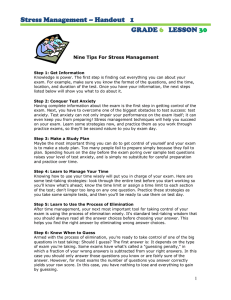
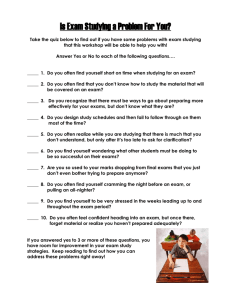
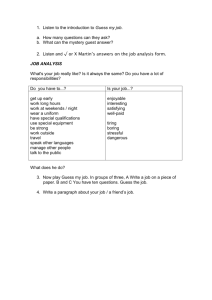
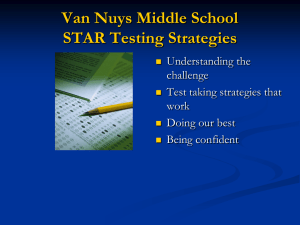


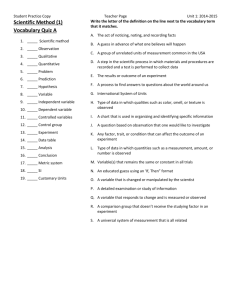
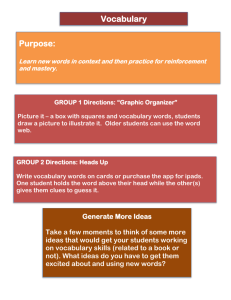
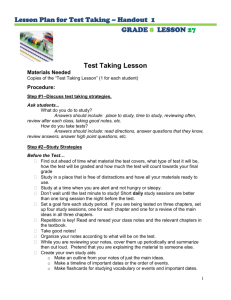
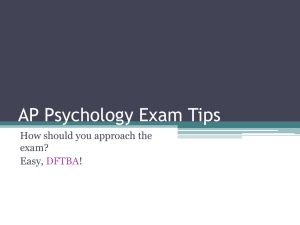

![This article was downloaded by: [University College London] Publisher: Psychology Press](http://s2.studylib.net/store/data/013237889_1-3e7ecae294b7a5e63053d2b08ca3073c-300x300.png)